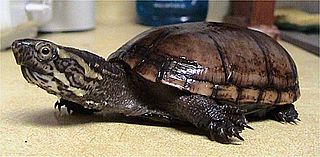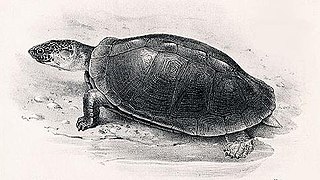
The coastal plain cooter or Florida cooter is a species of large herbivorous freshwater turtle in the genus Pseudemys.

Pelusios is a genus of African side-necked turtles. With 17 described species, it is one of the most diverse genera of the turtle order (Testudines).
The Namoi River snapping turtle, also commonly known as Bell's turtle, the Namoi River elseya, or Bell's saw-shelled turtle, is a species of turtle in the family Chelidae. The species is endemic to New South Wales, Australia.
The variable mud turtle, also known as Rhodesian mud turtle, Mashona hinged terrapin or variable hinged terrapin, is a species of turtle in the family Pelomedusidae. It is widely distributed in Central, East, and Southern Africa. The species was officially described by John Hewitt in 1927 and had to be broken into subspecies due to color variations on the heads of the turtles acrost the regions.

The East African black mud turtle, also known as the Pan terrapin, is a species of turtle in the family Pelomedusidae, native to eastern and southeastern Africa.

The eastern mud turtle or common mud turtle is a common species of turtle in the family Kinosternidae. The species is endemic to the United States. There are two recognized subspecies.

The striped mud turtle is a species of turtle in the family Kinosternidae. The species is native to the southeastern United States.

The tent tortoise is a species of tortoise and one of three members of the genus, Psammobates. Known locally as the Karoo tent tortoise, this highly variable species is found in South Africa and Namibia.

The peninsula cooter is a species of freshwater turtle in the genus Pseudemys. It is sometimes considered a subspecies of the coastal plain cooter when that turtle is not itself considered a subspecies of the river cooter.
The Alamos mud turtle is a species of mud turtle in the family Kinosternidae. It is endemic to Mexico, where it occurs in the states of Sinaloa and Sonora.

The West African mud turtle, also known as the West African side-necked turtle or swamp terrapin, is a species of turtle in the family Pelomedusidae. Pelusios castaneus is a freshwater species and is endemic to West and Central Africa.

Adanson's mud turtle is a species of turtle in the family Pelomedusidae. The species is endemic to north-central Africa.
The African keeled mud turtle is a species of turtle in the family Pelomedusidae. It is endemic to central Africa : the Democratic Republic of the Congo, the Republic of the Congo, and Gabon.
The Central African mud turtle is a species of turtle in the family Pelomedusidae. The species is endemic to Central Africa.
The Ivory Coast mud turtle is a species of turtle in the family Pelomedusidae. It is one of the most recently described turtle species. It is found in Sierra Leone, Liberia, Côte d'Ivoire, Ghana, Togo and Benin.

The African forest turtle is a species of turtle in the family Pelomedusidae. It is endemic to Africa, where it can be found in Angola, Burundi, Cameroon, Equatorial Guinea, Gabon, the Democratic Republic of the Congo, the Republic of the Congo, Ghana, Tanzania, and Uganda
Pelusios marani, also known as the Gabon mud turtle, is a species of turtle in the family Pelomedusidae. This species is endemic to Africa.
The African dwarf mud turtle is a species of turtle in the family Pelomedusidae. It is endemic to Africa : in Angola, the Democratic Republic of the Congo, Malawi, and Zambia. These mud turtles are the smallest of all African turtle species, “Nanus” which they are referred to are one of the 3 smallest turtle species in the world. The other two are Stink Pot Musk and Muhlenberg's Bog Turtles. All 3 species barely reach 4 inches as full grown adults. Like many of the world's chelonians, Pelusios castaneus has the potential to live a long life. Reports typically suggest more than 50 years in captivity for this species.

The West African black turtle is a species of turtle in the family Pelomedusidae. It is endemic to Africa, in Cameroon, Equatorial Guinea, Gabon, and Nigeria.

Williams' mud turtle is a species of turtle in the family Pelomedusidae. The species is endemic to Africa.













